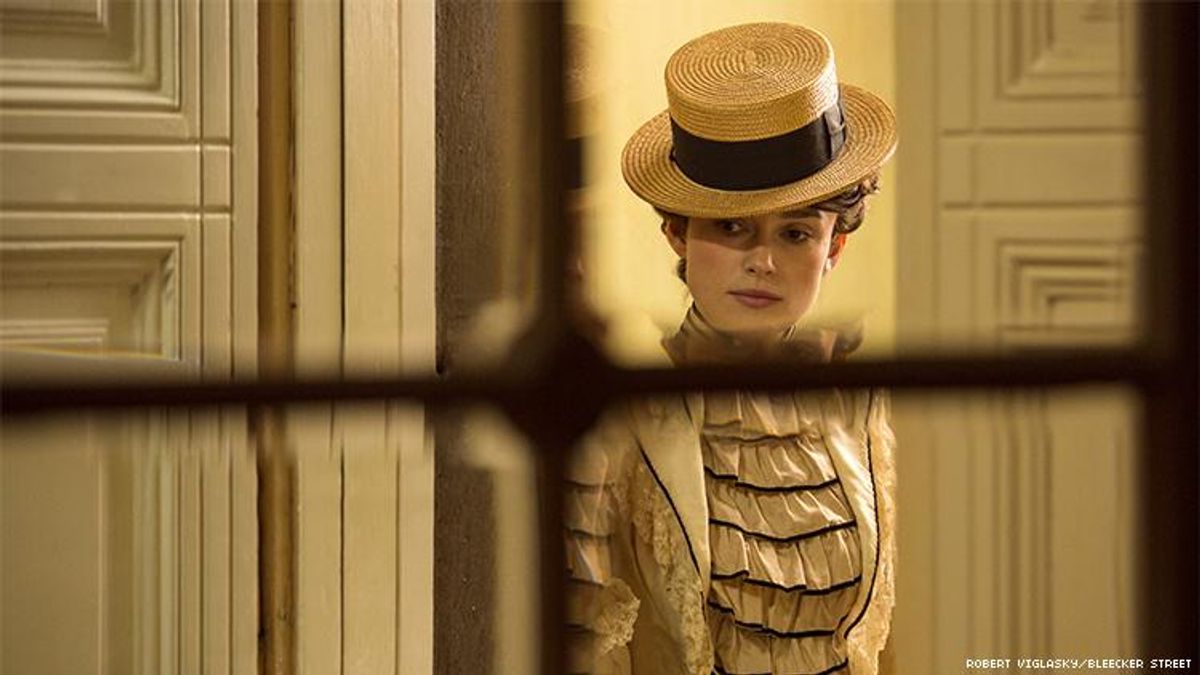Entertainment
REVIEW: 'Colette' Is a Well-Acted Introduction to a Feminist Icon

Writer Austin Dale reviews the highly-anticipated film.
September 21 2018 9:32 AM EST
September 21 2018 9:46 AM EST
By continuing to use our site, you agree to our Private Policy and Terms of Use.

Writer Austin Dale reviews the highly-anticipated film.
In Paris at the height of the Belle Epoque, one sophisticated author captured the attention of the reading public with a series of novels about Claudine, a cunning school girl who blossoms into a Parisian sophisticate. The books were from Willy, a publishing powerhouse whose office cranked out novels and articles with the help of ghostwriters, and Claudine was Willy's greatest success, because the true author of the series was Willy's wife, who went on to become one of the most famous French authors of all time. She, of course, was Colette, the iconic libertine whose later novels - Cheri, Gigi - are among the best loved in all of European literature.
Related | Keira Knightley: The Princess of Costume Dramas Finally Plays Queer
This is of course a natural subject for a biographical film. The era is a costume designer's wet dream, the multifaceted sex lives of its subjects are rich in dramatic potential, and the central conflict - over the official authorship of a bonafide literary phenomenon - is without rival as a cinematic playpen for proto-feminist gender politics. Directed by Wash Westmoreland from a script he wrote with playwright Rebecca Lenkiewicz and his late partner Richard Glatzer, Colette is standard art house fare for liberal arts majors, which is to say it has a strong pedigree, a lot on its mind, an elite cast of beauties, and just enough of a budget to execute splendid period pleasures.
The title role of Sidonie-Gabrielle Colette is here embodied by Keira Knightley, who could no doubt play this part in her sleep. The script lavishes her with fun things to do, and as usual she excels. Self-assured and fully-realized, Gabrielle arrives in Paris on the arm of her much-older husband with the refined wit and frank sexuality of a woman twice her age and from a different time. It is no wonder her books took off. But because Colette the woman and Colette the author both appear fully-formed from the get-go, there is little question about her not-to-be-fucked-with-ness. Of course she will contest her husband's proclaimed authorship, and of course she will come out on top and continue to change the world.
Therefore, although the film is ostensibly about Colette's journey, the juicier part belongs to Dominic West as Willy, a typically unpredictable man: In one moment he is a doting and encouraging husband and in the next he is a clueless egomaniac who cannot fathom why his wife is so damn upset about the whole Claudine situation! West navigates the nuances of the character carefully, especially in one dynamite sequence of events: Willy encourages Gabrielle's extramarital liaison with a bisexual Louisianian - played with a light, humorous touch by the extravagantly beautiful Eleanor Tomlinson - before making it a menage-a-trois without his wife's consent or even her knowledge.
Hardly a thing is out of place in Colette. The heroine's triumphant third-act monologue plays out in one long, exquisite close-up. The immaculately dressed sets are practically symmetrical in their dreamlike perfection. The cast's wigs, buttons, feathers, and necklines are all carefully positioned. And every few minutes, we get a fragrant whiff of Colette's genius prose in narration, usually over a montage of Knightley - Our Lady of the Perpetual Corset - writing away, often at a desk, sometimes in bed.
However, one distinguishing touch worth noting for a film in this genre is Westmoreland's colorblind and multicultural casting of Colette's milieu: Actors of color appear in vital supporting roles, and one particularly revolutionary writer of erotica is played by trans actress Rebecca Root. Late in the film, Colette's gender non-conforming lover Mathilde "Missy" de Morny (Denise Gough) discusses her identity with terminology that would not be out of place in a 21st century gender studies class. These decisions feel consciously in step with contemporary discussions on sexual, racial, and gender diversity, and they are the part of the film that most lives up to Colette's refreshingly loose and quietly revolutionary legacy.